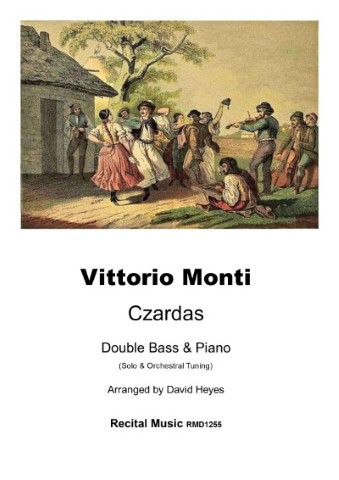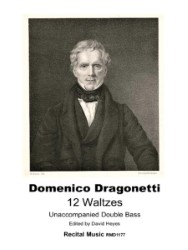Czardas arr. Double Bass and Piano

Composer: Monti, Vittorio
Arranger: David Heyes
Arranged for: Double Bass and Piano
Publisher:
| Product Code: | RMD1255 |
| Publishers Number: | RMD1255 |
| Language: | English |
| Condition: | New |
The term 'one-hit wonder' could be attached to many composers but possibly none more-so than Vittorio Monti (1868-1922). His Czardas for violin and piano is…
Vittorio Monti was an Italian violinist, composer, mandolinist, conductor and was born in Naples and studied at the Conservatorio di San Pietro a Majella. At the end of the 19th-century he was appointed conductor of the Lamoureux Orchestra in Paris, where he composed a number of ballets and operettas such as Noël de Pierrot, described as a three act ‘mimodrame’ and first performed in the city on 26 March 1900. Monti composed a number of works for mandolin, a favourite instrument of the Neapolitan region, including a Petite Méthode pour Mandoline which is described as Op.245 in the published edition, suggesting he was a very prolific composer indeed. His Czardas was composed during the early years of the 20th-century and was first published in Milan by G. Ricordi in 1904 in versions for violin or mandolin and piano, or violin and orchestra and is dedicated ‘a Mademoiselle Juliette Dantin – 1 Prix du Conservatoire de Paris’. The piece was quickly taken up by every Gipsy ensemble or orchestra, also by classical musicians, until it has become a standard virtuosic showpiece for almost every instrument.
The piece is in a number of sections defined, linked but also independent, with the opening piano introduction and its cimbalon-inspired music setting the scene. The first theme is dark and intense with scooping portamenti adding to the drama and exoticism of the music. The second theme has more forward momentum, with the occasional virtuosic flourish before the Allegro vivace begins in earnest, now driven by the use of offbeat syncopations and fast semiquaver passages. The music develops, both in intensity and excitement, with a strong and supportive piano accompaniment, before halting suddenly with a slower theme, marked Molto meno. The new music makes use of double stops and chords to add a sense of drama and lyricism which contrasts with the theme then played in false harmonics and with the accompaniment almost exclusively in treble clef. A sudden return of the fast arpeggio-inspired theme returns followed by the opening theme but now in the tonic major, but with the two musical ideas in reverse order before an even faster return of the Allegro vivace at bar 22, now marked piu presto, then molto piu vivo and a stringendo and confident perfect cadence to bring the excitement to a loud and successful conclusion.
Monti’s Czardas works well on double bass and, in the hands of a true virtuoso, it sounds as effortless as it does on a violin. Its sudden changes of tempo and mood create interest and excitement in equal measure, allowing the soloist to add rubato and drama, and also to demonstrate fast and spirited playing. The contrast of minor and major keys adds to the light and shade, creating a mini-masterpiece which surely gains in popularity year by year.
Czardas has long been a favourite showpiece or encore for double bassists and, although I don’t think there were any published editions in the 1980s, my first copy of the piece was a photocopy of a hand-copied solo part which fired my enthusiasm for the piece. It has been recorded by many bassists and there appear to be several published editions, including my own for Recital Music from 2008. Whichever edition you use or whichever key you play it in, this is a work which has become as popular with bassists as it has with violinists. It demonstrates so much of the potential of the double bass from the virtuosity and technical brilliance, to the passionate and evocative melodies alongside the use of harmonics, false or otherwise. Monti’s Czardas is a winner and a brilliant addition to the solo bass, Repertoire.
[David Heyes / 16 June 2017]
R.R.P £5.50
Our Price: £4.40
Digital Download – PDF
Shipping costs: No shipping
You might also like
-
12 Waltzes for Double Bass
£6.80 -
20 Melodic Pieces Book 1
£6.80 -
3 Pieces for Double Bass and Piano
£10.00 -
3 Random Rambles
£6.80




